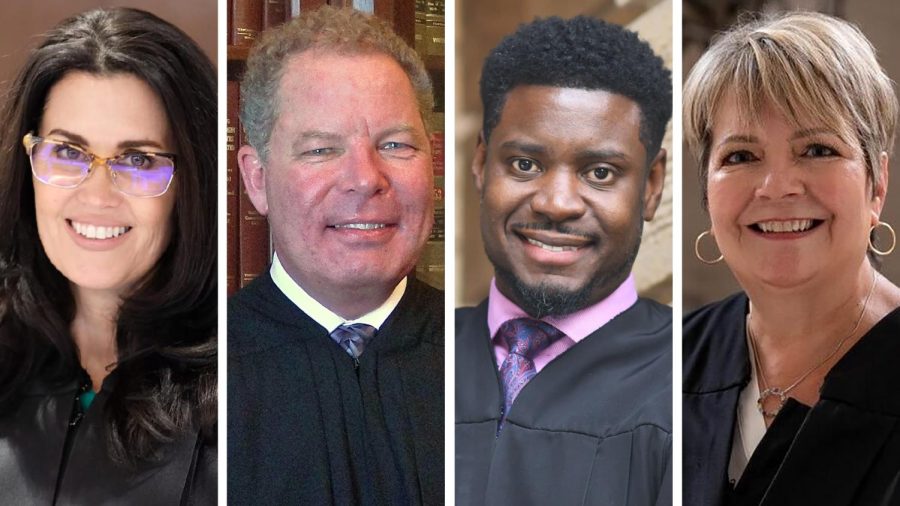Explained: The Wisconsin Supreme Court race and how to register to vote
February 6, 2023
On Tuesday, Feb. 21, four candidates will be running in the Wisconsin Supreme Court primary for one open seat on the court. The two candidates with the highest votes will then run against each other in the April 4 general election.
Despite the race being a nonpartisan election, candidates Jennifer Dorow and Daniel Kelly are viewed as Republican-supported conservatives, and candidates Everett Mitchell and Janet Protasiewicz are viewed as Democrat-supported liberals.
According to guides.vote, conservative justices currently have a 4-3 majority on the Wisconsin Supreme Court and this race could either sustain that majority or flip the court to a liberal majority.
According to UW-Madison Law School Associate Professor Robert Yablon, “This is an extremely high-stakes state Supreme Court race.” He said that some cases taken up by the court are likely to create an interest in the race throughout the country. One issue that will likely be seen by the justices is the 1849 abortion ban. Likewise, other controversial topics could appear before the court such as LGBTQ rights and affirmative action.
One of the Republican-supported conservative’s running for the seat is Jennifer Dorow. According to her official website, Dorow is a “judicial conservative who will not legislate from the bench.” The term “legislating from the bench” describes a Supreme Court justice who favors partisanship over legal precedence. Additionally, her website states that she has been serving as a Waukesha County Circuit Court Judge for more than 11 years after being appointed by former Governor Scott Walker.
During an interview with WISN 12 News, Dorow was asked, “what do you see the court’s role in major policy issues like abortion, redistricting, Act 10?” Dorow said, “A judge at its core should be someone who interprets the law and applies the law to the facts of the case.” Before her legal career, Dorow graduated from Marquette University and attended law school at Regent University School of Law where she earned her Juris Doctor (J.D.).
Dorow has spoken about a variety of partisan issues. On LGBTQ rights, Dorow stated that the decision in the U.S. Supreme Court case Lawrence v. Texas was “a prime example of judicial activism at its worst.”
Lawrence v. Texas was a case decided by the U.S. Supreme Court in 2003 that raised the constitutional question “Do the criminal convictions of John Lawrence and Tyron Garner under the Texas “Homosexual Conduct” law, which criminalizes sexual intimacy by same-sex couples, but not identical behavior by different-sex couples, violate the Fourteenth Amendment guarantee of equal protection of laws?”
The court ruled that “the Texas statute making it a crime for two persons of the same sex to engage in certain intimate sexual conduct violates the Due Process Clause.”
According to WisPolitics, Dorow supports the U.S. Supreme Court’s decision on the overturning of Roe v. Wade and is endorsed by Wisconsin Right to Life. Roe v. Wade was decided in 1973 and raised the constitutional question, “Does the Constitution recognize a woman’s right to terminate her pregnancy by abortion?”
The court ruled that “Inherent in the Due Process Clause of the Fourteenth Amendment is a fundamental ‘right to privacy’ that protects a pregnant woman’s choice whether to have an abortion.” Lastly, on bail reform Dorow said that current Wisconsin law does not allow judges to consider community safety when setting bail and that it is a flaw in Wisconsin’s system.
The second Republican-supported conservative running for the open seat is Daniel Kelly. According to Kelly’s website, he “will preserve constitutional rights, uphold the rule of law, and prevent judicial activism.”
His website also states that “his opponents are judicial activists who seek to impose their own political agenda on our state.” According to guides.vote, Kelly has previously clerked on the Wisconsin Court of Appeals and the U.S. Court of Federal Claims where he served as staff attorney.
In 2016, former Governor Scott Walker appointed Kelly to the Wisconsin Supreme Court where he served until 2020. After he completed his appointment to the Wisconsin Supreme Court, he joined the Institute for Reforming Government as a Senior Fellow. Kelly graduated from Carroll University and earned his J.D. from Regent University School of Law.
On LGBTQ rights, Kelly said that the legalization of same-sex marriage is an “illegitimate exercise of state power.” He also states that he opposes abortion. According to the Milwaukee Journal Sentinel, Kelly wrote a blog post in 2012 stating that the Democratic Party and National Organization for Women were “committed to normalizing taking the life of human beings.”
He also said, “We may safely charge [the Democratic Party and National Organization for Women] with knowingly favoring a policy that has as its primary purpose harming children. Why? To preserve sexual libertinism.” Kelly is endorsed by Pro-Life Wisconsin Victory Fund.
On affirmative action, Kelly said, “affirmative action and slavery differ, obviously, in significant ways” he continued by saying “but it’s more a question of degree than principle, for they both spring from the same taproot… Morally, and as a matter of law, they are the same.” According to Cornell Law School, affirmative action is designed to “eliminate unlawful discrimination among applicants, remedy the results of such prior discrimination, and prevent such discrimination in the future.”
On the other side of the aisle are judges Everett Mitchell and Janet Protasiewicz.
As a Democratic-supported liberal candidate, Everett Mitchell was elected to the Dane County Circuit Court and presides over the Juvenile Division in Branch Four. “During his tenure on the bench, Judge Mitchell has worked with colleagues to change courtroom policies to reflect trauma-informed practices, such as removing restraints and handcuffs on youth during hearings.”
According to his official website, Mitchell has also worked with the Madison Metropolitan School District to create an Office of Youth Engagement that “provides a bridge for youth involved in the criminal justice system to educational programming.”
Before Mitchell’s legal career, he attended Morehouse College. He then earned his Master of Divinity and a Master of Theology degree from Princeton Theological Seminary and a J.D. from the UW-Madison Law School.
On LGBTQ rights, Mitchell became the first pastor of a black Baptist church to marry same-sex couples. On abortion, Mitchell responded to the U.S. Supreme Court’s overturning of Roe v. Wade by saying, “We must turn our attention to the people of Wisconsin, the Wisconsin Supreme Court, and the Wisconsin Constitution to protect a woman’s reproductive choice.”
According to Spin, Mitchell has also vocalized his opinion on diversity on the court saying, “When I represented people as a defender, I would see how they would be treated by judges; and I didn’t like how they were treated. We really do need to have some diversity—and that’s not just diversity of skin color, but the diversity of experience—people who’ve experienced homelessness, trauma, and all the things that I had lived through; you need those kinds of experiences on the bench. Because it makes a difference in what you do and how you act.”
According to guides.vote, “Mitchell’s endorsements include former Democratic Governor Jim Doyle, former Wisconsin Supreme Court Justice Louis Butler, Madison police chief Shon Barnes, and Dane County Sheriff Kalvin Barrett, along with judges, other police chiefs, and elected officials.”
The second Democratic-supported liberal running for the Wisconsin Supreme Court is Janet Protasiewicz. Before running for the Wisconsin Supreme Court, Protasiewicz earned her bachelor’s degree from UW-Milwaukee and her J.D. from Marquette University, where she later served as an adjunct professor.
According to guides.vote, Protasiewicz has, “worked as a Milwaukee County assistant district attorney for more than 25 years and then in 2014 was elected to the Milwaukee County Circuit Court, where she currently serves in Family Court.”
On LGBTQ rights, Protasiewicz said, “we know it’s not up to the government to decide who we can or can’t love.” According to the Wisconsin Examiner Protasiewicz stated her opinion on abortion by saying, “In addition to independence, you bring your values to the court every day,… values leading me to believe that a woman’s right to make decisions over her own body should be just that, not made by the government but made by the person who’s ultimately being affected by them.”
On News 3 Now, Protasiewicz shared her priorities if winning the open seat by saying, “I think I have a commonsense approach that perhaps other people don’t have. I don’t consider myself a real partisan. I’m somebody who’s going to uphold the Constitution, who’s going to follow the law, and every day, do my best to get to the right decision by following the rule of law in these cases, nothing predetermined.”
Protasiewicz’s endorsements include current Wisconsin Supreme Court Justice Rebecca Dallet, Bricklayers & Allied Craftworkers of Wisconsin, United Auto Workers (UAW) Wisconsin State CAP Council, and American Federation of Teachers Local 212.
To vote in the Feb. 21 primary, you must first be registered to vote in the state of Wisconsin. You can check to see if you are registered on My Vote Wisconsin by typing in your first and last name and your date of birth. If you are registered and your address is up to date then you are all set to vote on Feb. 21.
If you are not registered to vote, My Vote Wisconsin will then ask you to register to vote online. To register online you must have a valid, unexpired Wisconsin Driver’s License or Wisconsin State ID Card. You will also need to match your name, date of birth, and address on file with the Wisconsin Department of Motor Vehicles (DMV). If you need to update your address with the DMV, you can do so on their website.
If there is an upcoming local election in your area in less than 20 days, you will be unable to register to vote online. Despite being unable to register online, you are still able to register by mail or delivery.
To register by mail, you can print, sign, and mail/deliver your registration form along with proof of residence to your local municipal clerk or polling place on Election Day. Proof of residence can include the following:
- Utility bill;
- Lease agreement;
- Credit card statement; or
- Mortgage statement
If you receive any of these statements online, you can still use the document by showing the clerk your name and address on the form. If you are planning on delivering your documents or registering in person the address for La Crosse City Hall is 400 La Crosse Street, La Crosse, WI 54601.







